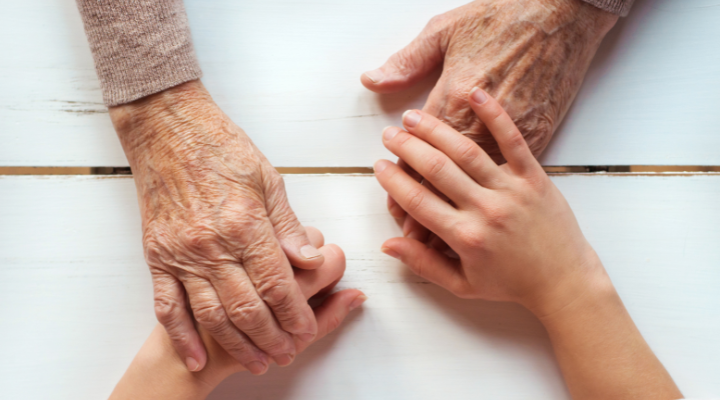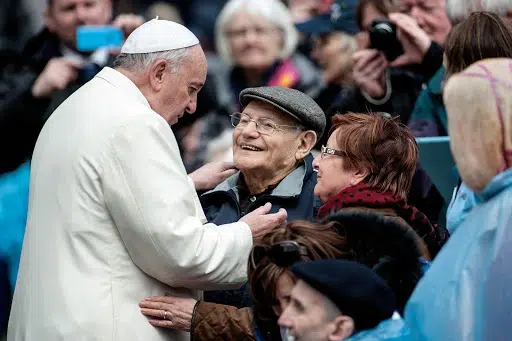
Francis pointed out that in the dominant culture, "the elderly are little valued, in their spiritual quality, their sense of community, their maturity and wisdom". And this, in the Pope's eyes, implies a "void of thought, imagination, creativity" (Ibid.). He insisted that without dialogue between generations we have "a sterile society, without a future, a society that does not look to the horizon, but looks at itself" (2-II-2022).
To the elders he said: "You have the responsibility to denounce the human corruption in which we live and in which continues that way of life of relativism, totally relative, as if everything were lawful. Go ahead. The world needs, it needs strong young people, who will go forward, and wise old people" (Ibid.).
To others, reminded them of their duty to protect the elderly and to educate in the care of the elderly. Regarding the fourth commandment Honor Father and Mother, he pointed out: "Honor is lacking when overconfidence, instead of manifesting itself as delicacy and affection, tenderness and respect, becomes rudeness and prevarication. When weakness is reproached, and even punished, as if it were a fault. When bewilderment and confusion become an occasion for mockery and aggression" (23-II-2022).
With the example of old Eleazar (cf. 2 M, 18 ff.), he indicated that "the practice of the faith is not the symbol of our weakness, but the sign of its strength" (General Audience, May 4, 2022.). And for this reason: "We will show, with all humility and firmness, precisely in our old age, that believing is not something 'for old people', but something vital. Believe in the Holy Spirit, who makes all things new, and he will gladly help us" (Ibid.). Faith lived is the heritage of old age.
"The elderly, by their weakness, can teach those who live other ages of life that we all need to abandon ourselves to the Lord, to invoke his help. In that sense, we all need to learn from old age: yes, there is a gift in being old understood as abandoning oneself to the care of others, beginning with God himself (Ibid). From this arises a "magisterium of fragility": not to hide the weaknesses of old age is a lesson of the elderly for everyone".
In the Gospel of St. John, Nicodemus asks Jesus: How can one be born when one is already old (Jn 3:4). And Jesus explains to him that old age is an opportunity to be reborn spiritually and to bring a message of the future, mercy and wisdom (cf. General Audience, 8-VI-2022).
Today, says the Pope, "old age is a special time to dissolve the future of the technocratic illusion of biological and robotic survival, but, above all, because it opens up to the tenderness of God's creative and generative womb." (Ibid.).
And so he teaches: "The old are the messengers of the future, the old are the messengers of tenderness, the old are the messengers of the wisdom of a life lived". (Ibid.).

Francis spoke of the role of physicians and healthcare workers in this shared responsibility between the families of the elderly and the healthcare system of a society, and stated, "All of medicine has a special role in society as a witness to the honor due to the elderly person and to every human person."
From the account of the healing of Simon's mother-in-law (cf. Mk 1:29-31), Francis considers: "When you are old, you no longer command your body. It is necessary to learn to accept one's limits, what we can no longer do." (cf. General Audience, 15-VI-2022). ("I too must now go with a cane").
"He rose up and began to serve them". The Pope says: "The elderly who preserve the disposition for healing, consolation, intercession for their brothers and sisters - be they disciples, centurions, people troubled by evil spirits, discarded people... - are perhaps the highest testimony of purity of that gratitude that accompanies faith. All this, she observes, is not exclusive to women. But women can teach men about gratitude and the tenderness of faith, which is sometimes more difficult for them to understand".
In the dialogue between the risen Jesus and Peter at the end of John's Gospel (21:15-23, cf. General Audience 22-VI-2022), Francis also finds grounds for advising the elderly.
"You must be a witness for Jesus even in weakness, sickness, and death.. Moreover, the Lord always speaks to us according to our age. And our following must learn to allow ourselves to be instructed and shaped by our own frailty, our helplessness, our dependence on others, even in our clothing, in our walk".
The spiritual life (through prayer and the sacraments, especially the Eucharist and confession of sins) is what gives us the strength and wisdom to know how to say goodbye with a smile: "a joyful farewell: I have lived my life, I have kept my faith". It is up to others, especially the young, to help the elderly to live and express this wisdom, and to know how to receive it.
In the same vein, near the end of the catechesis, the Pope invites us to reread Jesus' farewell (cf. Jn 14): "When I have gone and prepared a place for you, I will come again and receive you to myself, so that where I am you may be also" (14:3). Peter's successor affirms: "The time of life on earth is the grace of that passage. The presumption of stopping time-wanting eternal youth, unlimited well-being, absolute power-is not only impossible, it is delusional" (cf. General Audience, 10 August 2022).
Here below, life is initiation, imperfection on the way to a fuller life. And Francis takes the opportunity to say that our preaching, where beatitude, light and love abound, "perhaps lacks a little life".
The Pope's original catechesis on the "white-haired old man" who appears in the Book of Daniel (7:9; cf. General Audience, August 17, 2022) is connected with this. This is how God the Father is usually represented. But this," Francis observes, "is not a silly symbol" that should be demythologized. It is a symbol of an eternal existence, of the eternity of God, always ancient and always new, with his strength and his nearness; "because God always surprises us with his newness, he always comes to meet us, every day in a special way, for that moment, for us.
Francis brought his catechesis on old age to a close by contemplating the mystery of the assumption of the Virgin (cf. General Audience, August 24, 2022). In the West," he recalled, "we contemplate her raised on high, wrapped in glorious light; in the East she is represented lying down, asleep, surrounded by the Apostles in prayer, while the Risen One carries her in his hands like a child. The Pope indicates that the connection of the Assumption of the Virgin with the Resurrection of the Lord, to which our own is linked, when we will rise with him at the end of time, should be emphasized.
Mary precedes us in her assumption into heaven, also as a figure of the Church, which will be in the end: the extension of the risen body of Christ, made family. Jesus speaks of this - of the full life that awaits us in the Kingdom of heaven - with various images: the wedding feast, the feast with friends, the rich harvest, the fruit that comes, not without pain. From all of this and for the good of others - Francis proposes, including himself in the group - "We, the elderly, must be the seed, the light and also the restlessness of that fullness of life that awaits us".
Mr. Ramiro Pellitero Iglesias
Professor of Pastoral Theology at the Faculty of Theology of the University of Navarra.
(*)Published in "Iglesia y nueva evangelización".